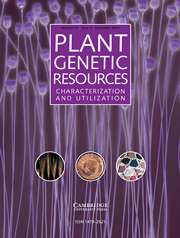Crossref Citations
This article has been cited by the following publications. This list is generated based on data provided by
Crossref.
Wang, M. L.
Barkley, N. A.
Chinnan, M.
Stalker, H. T.
and
Pittman, R. N.
2010.
Oil content and fatty acid composition variability in wild peanut species.
Plant Genetic Resources,
Vol. 8,
Issue. 3,
p.
232.
Chen, Zhenbang
Wang, Ming Li
Barkley, Noelle A.
and
Pittman, Roy N.
2010.
A Simple Allele-Specific PCR Assay for Detecting FAD2 Alleles in Both A and B Genomes of the Cultivated Peanut for High-Oleate Trait Selection.
Plant Molecular Biology Reporter,
Vol. 28,
Issue. 3,
p.
542.
Lopes, Renata Miranda
Agostini-Costa, Tânia da Silveira
Gimenes, Marcos Aparecido
and
Silveira, Dâmaris
2011.
Chemical Composition and Biological Activities of Arachis Species.
Journal of Agricultural and Food Chemistry,
Vol. 59,
Issue. 9,
p.
4321.
Wang, Ming Li
Sukumaran, Sivakumar
Barkley, Noelle A.
Chen, Zhenbang
Chen, Charles Y.
Guo, Baozhu
Pittman, Roy N.
Stalker, H. Thomas
Holbrook, C. Corley
Pederson, Gary A.
and
Yu, Jianming
2011.
Population structure and marker–trait association analysis of the US peanut (Arachis hypogaea L.) mini-core collection.
Theoretical and Applied Genetics,
Vol. 123,
Issue. 8,
p.
1307.
Wang, Ming Li
Barkley, Noelle A.
Chen, Zhenbang
and
Pittman, Roy N.
2011.
FAD2 Gene Mutations Significantly Alter Fatty Acid Profiles in Cultivated Peanuts (Arachis hypogaea).
Biochemical Genetics,
Vol. 49,
Issue. 11-12,
p.
748.
Wang, Ming Li
Chen, Charles Y.
Tonnis, Brandon
Barkley, Noelle A.
Pinnow, David L.
Pittman, Roy N.
Davis, Jerry
Holbrook, C. Corley
Stalker, H. Thomas
and
Pederson, Gary A.
2013.
Oil, Fatty Acid, Flavonoid, and Resveratrol Content Variability and FAD2A Functional SNP Genotypes in the U.S. Peanut Mini-Core Collection.
Journal of Agricultural and Food Chemistry,
Vol. 61,
Issue. 11,
p.
2875.
Pandey, Manish K
Wang, Ming Li
Qiao, Lixian
Feng, Suping
Khera, Pawan
Wang, Hui
Tonnis, Brandon
Barkley, Noelle A
Wang, Jianping
Holbrook, C Corley
Culbreath, Albert K
Varshney, Rajeev K
and
Guo, Baozhu
2014.
Identification of QTLs associated with oil content and mapping FAD2 genes and their relative contribution to oil quality in peanut (Arachis hypogaeaL.).
BMC Genetics,
Vol. 15,
Issue. 1,
Chen, Charles Y.
Barkley, Noelle A.
Wang, Ming L.
Holbrook, C. Corley
and
Dang, Phat M.
2014.
Registration of Purified Accessions for the U.S. Peanut Mini-Core Germplasm Collection.
Journal of Plant Registrations,
Vol. 8,
Issue. 1,
p.
77.
Dwivedi, Sangam
Puppala, Naveen
Maleki, Soheila
Ozias‐Akins, Peggy
and
Ortiz, Rodomiro
2014.
Plant Breeding Reviews: Volume 38.
p.
143.
Wang, Ming Li
Tonnis, Brandon
An, Yong-Qiang Charles
Pinnow, Dave
Tishchenko, Viktor
and
Pederson, Gary A.
2015.
Newly identified natural high-oleate mutant from Arachis hypogaea L. subsp. hypogaea.
Molecular Breeding,
Vol. 35,
Issue. 9,
Wang, Yun
Zhang, Xingguo
Zhao, Yongli
Prakash, C.S.
He, Guohao
Yin, Dongmei
and
Bell, J.B.
2015.
Insights into the novel members of the FAD2 gene family involved in high-oleate fluxes in peanut.
Genome,
Vol. 58,
Issue. 8,
p.
375.
Wang, Ming Li
Khera, Pawan
Pandey, Manish K.
Wang, Hui
Qiao, Lixian
Feng, Suping
Tonnis, Brandon
Barkley, Noelle A.
Pinnow, David
Holbrook, Corley C.
Culbreath, Albert K.
Varshney, Rajeev K.
Guo, Baozhu
and
Prasad, Manoj
2015.
Genetic Mapping of QTLs Controlling Fatty Acids Provided Insights into the Genetic Control of Fatty Acid Synthesis Pathway in Peanut (Arachis hypogaea L.).
PLOS ONE,
Vol. 10,
Issue. 4,
p.
e0119454.
Nawade, Bhagwat
Bosamia, Tejas C.
Thankappan, Radhakrishnan
Rathnakumar, Arulthambi L.
Kumar, Abhay
Dobaria, Jentilal R.
Kundu, Rahul
and
Mishra, Gyan P.
2016.
Insights into the Indian Peanut Genotypes for ahFAD2 Gene Polymorphism Regulating Its Oleic and Linoleic Acid Fluxes.
Frontiers in Plant Science,
Vol. 7,
Issue. ,
Hu, X. H.
Zhang, S. Z.
Miao, H. R.
Cui, F. G.
Shen, Y.
Yang, W. Q.
Xu, T. T.
Chen, N.
Chi, X. Y.
Zhang, Z. M.
and
Chen, J.
2018.
High-Density Genetic Map Construction and Identification of QTLs Controlling Oleic and Linoleic Acid in Peanut using SLAF-seq and SSRs.
Scientific Reports,
Vol. 8,
Issue. 1,
Wang, Qiang
2018.
Peanut Processing Characteristics and Quality Evaluation.
p.
69.
Tang, Yanyan
Huang, Jianbin
Ji, Hongchang
Pan, Leilei
Hu, Changli
Qiu, Xiaochen
Zhu, Hong
Sui, Jiongming
Wang, Jingshan
and
Qiao, Lixian
2022.
Identification of AhFatB genes through genome-wide analysis and knockout of AhFatB reduces the content of saturated fatty acids in peanut (Arichis hypogaea L.).
Plant Science,
Vol. 319,
Issue. ,
p.
111247.
Neelakandan, Anjanasree K.
Wright, David A.
Traore, Sy M.
Chen, Xiangyu
Spalding, Martin H.
and
He, Guohao
2022.
CRISPR/Cas9 Based Site-Specific Modification of FAD2 cis-Regulatory Motifs in Peanut (Arachis hypogaea L).
Frontiers in Genetics,
Vol. 13,
Issue. ,
Le, Van-Anh
2022.
Gac Fruit.
p.
156.
Liu, Zhaoxin
and
Li, Xiangdong
2023.
A comparative study of oil, protein, and fatty acid content of 12 cultivars of peanut (Arachis hypogaea L.) grown from two regions in Shandong province, China.
Crop Science,
Vol. 63,
Issue. 4,
p.
2491.
Zhang, Hui
Yu, Yan
Wang, Mingli
Dang, Phat
and
Chen, Charles
2023.
Effect of Genotype-by-Environment Interaction on Oil and Oleic Fatty Acid Contents of Cultivated Peanuts.
Horticulturae,
Vol. 9,
Issue. 12,
p.
1272.


